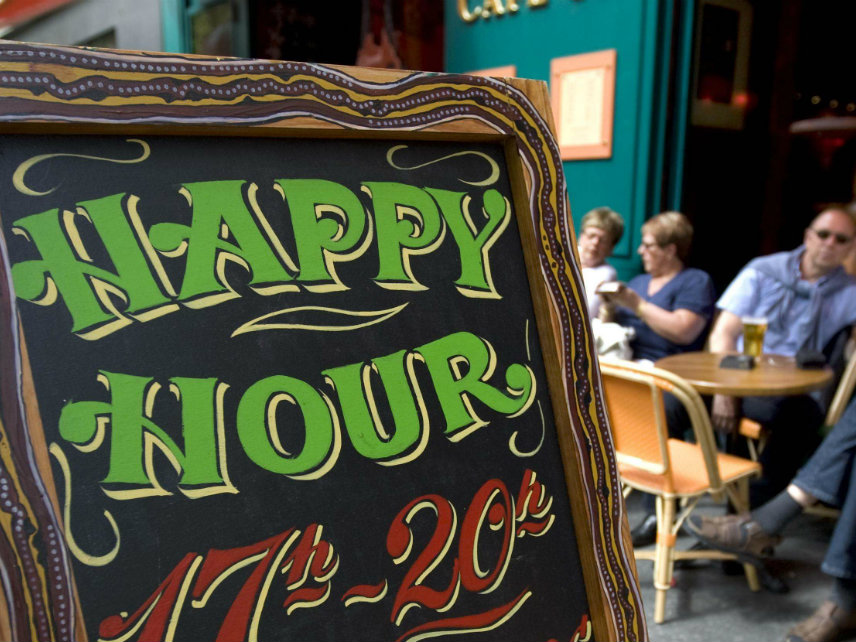Virginia Alcohol Regulators Said Ending Ban on Happy Hour Ads Would Literally Kill People, Then Supported Ending the Ban
This is a clear victory for freedom, but the way it went down might make you scratch your head a little.

While defending a state law against letting bars advertise discounted drink specials, the Virginia Virginia Alcoholic Beverage Control Authority (ABC) made an argument that was equal parts tragic and absurd.
In the opening lines of a legal brief backing Virginia's ban on advertising happy hours, the ABC's lawyers told the story of Chamica Adams, a 23-year-old Maryland resident, who drunkenly struck two pedestrians with her car in 2011 after leaving an all-you-can-drink happy hour in Washington, D.C. One of the pedestrians was severely injured, and the other one died. "Tragic traffic accidents resulting from happy-hour drinking are not isolated events," the attorneys argued. "Such tragedies and threats to public safety are what the Virginia laws and regulations at issue in this case are intended to prevent."
As tragic as Adams' situation was—she was sentenced to 3.5 years in prison for the accident—the story had almost nothing to do with the facts of the lawsuit, which challenged the constitutionality of a weird Virginia law that allows bars and restaurants to host happy hours as long as they don't talk about them.
Geoff Tracy, the owner of three restaurants in the D.C. metro area (one of them in Virginia) and the plaintiff in the federal lawsuit, was arguing that Virginia's happy hour advertising restrictions prevent business owners from communicating truthful information about their offerings, making it more difficult to attract customers. Tracy also couldn't legally use the same advertisements for all three of his locations. Even posting those ads on social media or his restaurant's website could run afoul of the law.
The ABC's response—rolling out the "people will die!" argument in federal court—made little sense on several levels. There's no reason to believe that Adams' intoxication, or her decision to drive drunk, was influenced by advertisements for drink specials. All-you-can-drink happy hours like the one she attended are illegal in Virginia, and they were not part of the lawsuit. And Tracy wasn't trying to overturn rules against overserving customers or drunk driving; he just wanted to be able to tell potential customers that they could have $2 off a Bud Light in the evenings.
Thankfully, Virginia state lawmakers seem a little more reasonable. Last week, the state House and state Senate both passed bills that would do away with the state's ban on happy hour advertising. The two bills still need to be reconciled with each other and then signed by Gov. Ralph Northam, but both cleared with wide bipartisan support last week and should sail through the rest of the legislative process—in part because the ABC testified in favor of the changes.
Virgina's sudden about-face on the happy hour issue is a clear victory for Tracy, but the way it went down has Anastasia Boden, an attorney with the Pacific Legal Foundation who represented Tracy in his suit against the state, scratching her head. The Virginia ABC sought to delay the lawsuit several times, and it requested more than 60,000 pages of financial information from Tracy and his restaruants—only to ask the legislature to repeal the laws before a judge could rule. That allowed the ABC to avoid a sweeping ruling that may have limited its ability to engage in similar "paternalistic censorship" in the future, says Boden.
"In the first paragraph of their brief, they are arguing to the judge that the restrictions are intended to prevent tragic and fatal accidents," she tells Reason. "Yet they were simultaneously working to get the law repealed in the legislature to moot our lawsuit. Is the law necessary to prevent deaths and be compliant with the First Amendment, or not?"
Either way, the impending demise of the law is an undeniable victory for liberty in Virginia.
Even by the typical standards of weird state-level alcohol laws, Virginia's ad ban stands out. For example, advertising "half-price drinks," is completely legal. Calling the same discount a "two-for-one special" is a violation of state law and can get an establishment's license suspended for seven days. The same punishment applies if a bar is caught advertising deals under terms like "Thirsty Thursday" or "Sunday Funday." And even though bars can announce a "happy hour" on social media or on sidewalk placards, they are still prohibited from specifying what the discounts are—so consumers are still mostly in the dark until they walk inside.
The rules used to be even more restrictive. Until January 2014, bars and restaurants were only allowed to advertise the existence of happy hours or drink specials inside the establishment itself.
Meanwhile, residents of Virginia are left with the knowledge that the state's booze regulators stand ready to defend every regulation as a matter of life and death—even when that's obviously not true.
"Everyone knew that the restrictions were unnecessary," says Tracy. "The Virginia ABC even testified in support of this legislation! So ultimately, they were speaking out of both sides of their mouth and wasting a lot of taxpayer money."


Show Comments (8)